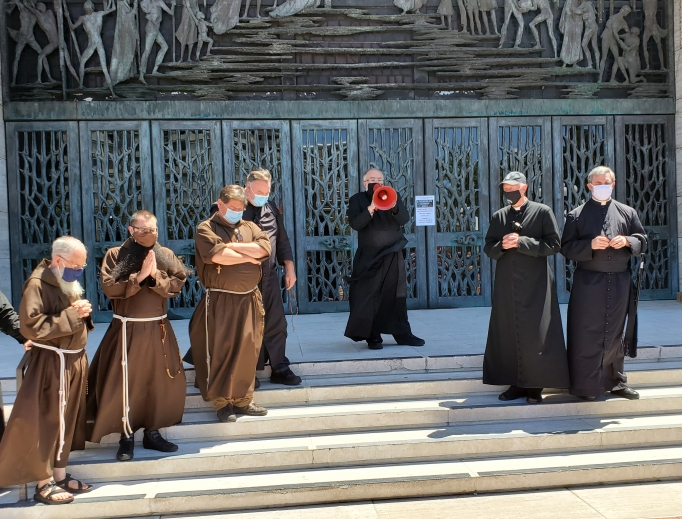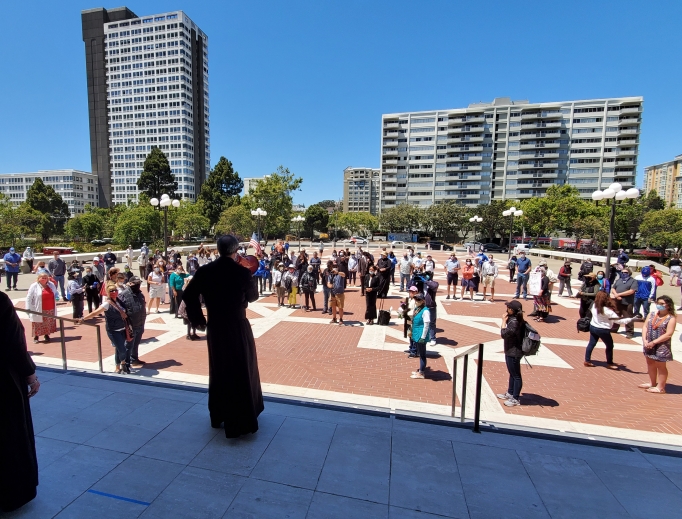Church vs. State in San Francisco Shutdown Showdown
As coronavirus cases surge in California, San Francisco Archbishop Salvatore Cordileone struggles to meet competing demands from city officials and local Catholics.

Editor’s Note: This story has been updated to reflect the information provided by San Francisco City Attorney’s Office that houses of worship were never permitted to reopen for indoor masses after being shut down due to the pandemic.
SAN FRANCISCO — Months after San Francisco civic officials closed local businesses and barred religious services in a bid to contain the spread of the novel coronavirus, Catholic churches were finally expecting to hold Sunday Masses June 15, much to the relief of thousands of Catholic parishioners who celebrated the return to a semblance of normalcy.
The indoor Masses in parishes throughout the Archdiocese of San Francisco, begun in mid-June, barely lasted two weeks.
Today only outdoor Masses and funerals limited to 12 are permitted.
On June 29, City Attorney Dennis Herrera sent a letter to the Archdiocese of San Francisco, directing its parishes to cease and desist indoor public Masses. The city allowed the archdiocese just one day to comply with the order. The letter charged that local Catholic churches had failed to adhere to public-health protocols for worship services and said the city had received numerous complaints of infractions, including the failure of some congregants and pastors to wear
The ongoing ban on indoor services has left churchgoers frustrated, but a spokesman for San Francisco City officials said they never issued a policy change. The San Francisco archdiocese, for its part, suggested that shifting timelines and miscommunication between Church and government officials were to blame for the confusion.
According to John Coté, communications director for the San Francisco City Attorney’s Office, the Archdiocese of San Francisco was never given permission to open church doors.
“Indoor gatherings of any kind, including religious services, were never allowed under San Francisco’s health order (with some very limited exceptions, like funerals with 12 or fewer people),” Cotétold the Register via email on July 18.
While the California Department of Public Health released guidelines allowing for the resumption of religious services in late May, with the requirement that churches limit total attendance to 25% of a building’s capacity among other health precautions, reopening plans for houses of worship were subject to the approval of the local county.
Although originally San Francisco churches were scheduled to reopen mid-June, on June 11 the City Attorney’s Office sent the archdiocese an email communicating “the San Francisco Health Officer’s determination that indoor services with congregants continue to pose a serious public health risk and are consequently prohibited under the Health Order for the time being,” said Coté.
“The City and County of San Francisco never rescinded that rule.”
After receiving Herrera’s June 29 letter, the archdiocese quickly responded, and promised to comply with the city’s directive.
Archdiocesan General Counsel Paula Carney pledged that local Church officials would continue to “work cooperatively” with the city in a June 30 letter to Herrera, even as she defended the archdiocese’s good-faith effort to comply with shifting and sometimes confusing protocols.
San Francisco priests, Carney promised, would be informed that “the order limiting religious services to outdoors with no more than 12 people remains in force with appropriate social distancing and face coverings.”
In an interview with the Register, Archbishop Cordileone disputed details of the charges in Herrera’s letter. And he said that he had worked for the past two months to address the concerns raised by the city, amid national reports that church services had contributed to virus.
“I have been in constant communication with city officials and other community leaders to try to resolve this in a mutually satisfactory way,” he said.
“We submitted safety plans two months ago and haven’t heard back. The city responded to the safety plans of retail outfits, and I would like the city to do the same for us. We want to do this in a responsible way that would keep people safe.”
As the archdiocese scrambled to pull back from indoor liturgies, the news blindsided Catholics eager to return to Mass.
An estimated 200 Catholics gathered on July 5 for a peaceful prayer service that began at St. Mary’s Cathedral and ended at City Hall.

‘Outrageous and Discriminatory’
In an email message about the gathering to fellow San Francisco Catholics, Eva Muntean described the city’s prohibition on indoor services as “outrageous” and “discriminatory.” She urged local parishioners to contact both the city and the archdiocese to register their belief that indoor church services should be available.
“We were operating under the presumption that the city of San Francisco, along with the entire state, had opened up church services to 25% of [the building’s] capacity, or no more than 100 people, and we were fine with that,” Muntean, co-founder of the Walk for Life West Coast, told the Register.
Muntean conceded that Archbishop Cordileone had not publicly challenged the city’s health order, though some U.S. dioceses have gone to court to push back against similar public-health directives.
“I love the archbishop,” she said, “but I think he should do more in this situation.”
The city’s continued prohibition on indoor religious services mark a new and potentially dangerous inflection point for California, now in its fourth month of its campaign to bring the pandemic under control.
In May, California’s early decision to issue sweeping restrictions to limit transmissions was heralded as a model for emulation by other states, like New York, which faced an explosion of cases.
Now, the Golden State is battling a surge of infections, increasingly among young people, and San Francisco is among several cities that have stepped back from plans for a more expansive reopening of the local economy.
In early July, the San Francisco Chronicle marked a 49% increase in COVID-related hospitalizations across the city, including 13 inmates transferred from San Quentin State Prison, which is battling a major outbreak.
As of July 6, the city has conducted a total 157,324 COVID tests with 4,020 positive results and 50 deaths, according to data relayed by local public0health officials.
The sharp increase in hospitalizations has raised the stakes for Archbishop Cordileone, who has also stressed the Church’s concern with protecting the vulnerable during a pandemic that has taken the lives of an estimated 133,000 Americans.
“The archbishop is, of course, balancing the present needs of the faithful — which would appear more acute than ever — with the Church’s ongoing relationship with the city, which, one would hope, benefits the faithful in the long term as well as the entire community,” said James Sonne, founding director of the Religious Liberty Clinic at Stanford Law School.
“But the city must likewise be careful,” he added. “Physical and spiritual health are both interests of the highest order, particularly at times of great suffering.”
“The situation appears to be changing daily, which, of course, makes things more difficult for everyone — legally and otherwise,” Sonne told the Register.
But even as attendance at outdoor Catholic Masses is now restricted to a total of 12 people, the city has allowed local restaurants to open outdoor dining facilities.
The restaurants are subject to social-distancing guidelines, and patrons must wear masks as much as possible, among other requirements.
Still, the reopening of these establishments has deepened the frustration of Catholics, who believe the local Church is being treated unfairly.
“Dozens of people eat at restaurants on the streets around my church, without masks,” Father Joseph Illo, pastor of Star of the Sea Church in San Francisco, wrote in a July 2 email to parishioners.
“The mayor addresses hundreds of people in a protest at City Hall, many of whom wear no masks,” he added. “And the city is telling my church that we cannot have a gathering of more than 12 people, outside, for an activity that is specifically protected by the Constitution?”
Star of the Sea was among a number of local parish churches flagged by city officials for allegedly failing to comply with public-health protocols. Father Illo disputed at least some of the city’s charges against him in the email to his parishioners and promised to follow Archbishop Cordileone’s lead on church reopenings.
‘Limits to Deference’
No doubt, the city’s apparent tolerance of recent local protests sparked by the May 25 death of George Floyd, who was in Minneapolis police custody, has also contributed to the sense that church services have been singled out for more severe treatment than other forms of constitutionally protected behavior that also posed a risk to public health.
Across the nation, many Americans have raised concerns about the “politicization” of the public-health establishment, as epidemiologists and other experts appeared to condone mass demonstrations in a departure from their previous call for complete adherence to state and city protocols.
“Was public health advice in a pandemic dependent on whether people approved of the mass gathering in question?” asked a July 6 New York Times news story. “To many, the answer seemed to be ‘yes.’”
Back in San Francisco, a progressive stronghold, some worried Catholics told the Register that Archbishop Cordileone’s recent public defense of St. Junípero Serra, following the toppling of a statue depicting the saint in a city park, might have prompted crackdown on the archdiocese. They offered no proof for such speculation, and Archbishop Cordileone has not aired such concerns, as he works to resolve city and county objections.
Meanwhile, local officials have defended their evolving guidelines. “San Francisco’s response to the coronavirus emergency is grounded in data, science and facts,” read a statement on the San Francisco Department of Public Health’s COVID dashboard.
But if some San Francisco Catholics are impatient with city health directives, other parishioners told the Register that the guidelines were justified and did not constitute a threat to religious freedom.

For now, at least, Archbishop Cordileone appears unwilling to adopt a more confrontational posture. Likewise, in the adjacent Diocese of Oakland, Bishop Michael Barber has maintained a strikingly sober tone.
“I have received many beautiful and respectful emails and letters from our parishioners expressing great longing to go to Mass and receive Our Lord in Holy Communion,” said Bishop Barber in a statement posted on the diocesan website. “My answer: I will reopen the churches for Mass in our diocese when it is safe to do so.”
Could these Church leaders change course in the near future?
That will likely depend on whether they have a strong case to make to their flock, the public and the courts.
“In the main, the courts have tended to defer to local authorities in the immediate interest of public health,” said Sonne, citing a recent U.S. Supreme Court decision.
“But there are limits to this deference,” he added, noting that judges have “stepped in” when religious services are treated more harshly than other gatherings that pose a similar health risk, or “where they are singled out for disfavored treatment.”
“The city’s approach here seems pretty aggressive — particularly in its tone and by comparison to other situations,” Sonne said. “But, as in so many religious-liberty disputes, the devil’s in the details.”
Joan Frawley Desmond is the Register’s senior editor.
This story was updated July 9 with comments from Archbishop Cordileone and
July 18 with comments from John Coté of the San Francisco City Attorney's Office..
- Keywords:
- archbishop cordileone
- california
- church
- church reopening
- coronavirus
- joan frawley desmond
- religious freedom
- san francisco
- state

















